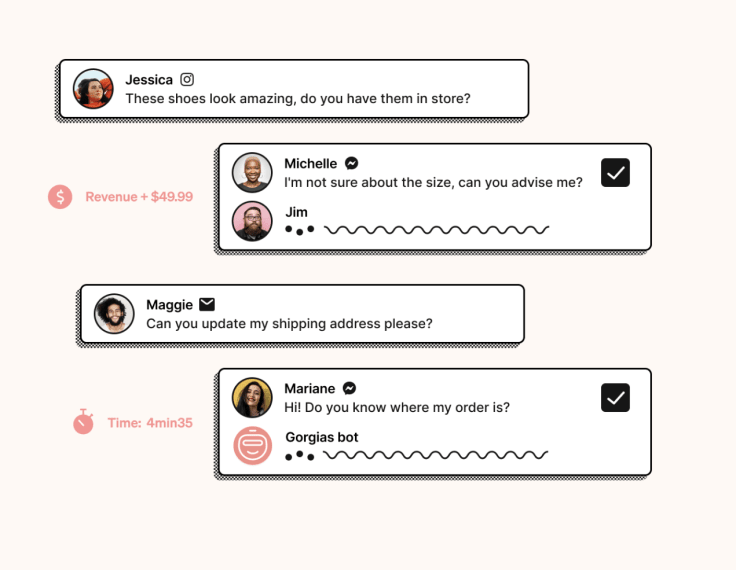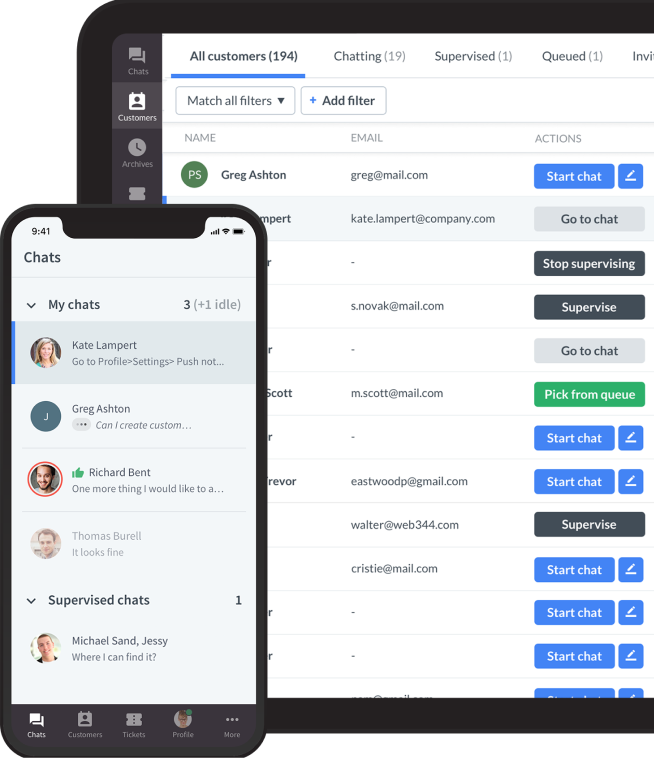Showing top 0 results 0 results found
Showing top 0 results 0 results found

What's the first thing that comes to mind when considering an AI agent? Many people think of chatbots. They assume they're just automated systems running pre-scripted dialogues.
Others think any software that automates routine tasks is an AI agent. But true AI agents are different. They can adapt quickly, make decisions based on goals, and respond instantly.
They're also not as complicated or inaccessible as the myths might make it seem. In fact, businesses in various industries can use them right away. From answering customer support questions to tweaking marketing campaigns, advanced AI agents are easily accessible and a must-have for any business looking to stay competitive.
To help you cut through the AI misconceptions, I’ll walk you through concrete AI agent examples — from ecommerce to healthcare — so you can see their potential for yourself.
What are AI agents?
AI agents are smart software tools that handle tasks independently and learn on the job. Unlike traditional automation tools or simple chatbots, they don't just follow a script or set of rules. They think on their feet — or, in this case, code — and make real-time decisions based on what's happening around them. Imagine a software assistant who doesn't just respond but also learns and gets smarter over time through interaction. That's what an AI agent does.
There are different types of AI agents, each with its own level of complexity and intelligence. For instance, simple reflex agents respond directly to specific inputs with pre-defined rules. In contrast, model-based reflex agents use internal models to understand the world and handle more dynamic situations. Then there are utility-based agents, which evaluate multiple possible actions and choose the one that maximizes a desired outcome — like customer satisfaction or efficiency.
Goal-based agents plan actions that help achieve specific objectives, considering the current state and the desired outcome. Hierarchical agents take this further by structuring tasks into layered subtasks, enabling more organized and scalable decision-making.

In more complex environments, multi-agent systems come into play, where multiple AI agents work together — each with its role — to solve problems collaboratively or handle distributed tasks.
Now think of a basic chatbot like the person at the front desk who always gives the same answer, no matter who's asking. But an AI agent? It remembers you, knows your preferences, and predicts your needs. For example, if you frequently check your delivery status, the AI agent might notice the pattern and proactively update you when something changes. It could also suggest faster ways to get things done.
Did you know that Netflix’s recommendation system is an AI agent that continuously learns your viewing preferences to suggest shows you'll probably love?
How do AI agents work?
Now that we understand what AI agents do, it's time to look at how they do it. Every wise decision, quick reply, or personalized suggestion is thanks to a robust set of technologies working in real time.
Let's break them down.
Natural language processing (NLP)
This is how AI agents "speak human." NLP allows them to understand and interpret how we naturally talk or type, even when we're not precise. Whether a customer asks, "Where's my order?" or says something casual like, "Hey, did my package ship yet?" — the AI agent understands the intent behind the words, not just the literal phrasing.
It can also sometimes detect sentiment, urgency, and even sarcasm. This means customers don't have to speak in code or click through endless menus. They can just talk, and the AI understands.
Machine learning with predictive powers
AI agents don't just react to the present moment — they're constantly learning from the past to improve future outcomes. With the help of machine learning, these intelligent agents sift through massive amounts of data to find patterns, trends, and habits. Because of that, they can make accurate predictions and helpful suggestions in real time.
For example, if the system notices that a customer reorders coffee every three weeks, it can send a timely reminder just before they run out. If customers frequently encounter a problem after an update, the AI can proactively offer a fix.
Intelligent automation and smart routing
AI agents thrive on taking the time-consuming, repetitive tasks off your team's plate. They can automatically handle common requests like password resets, order status checks, and appointment confirmations, freeing your human agents to perform complex tasks and high-value interactions. But their intelligence doesn't stop there.
When a request does require a human, AI-powered routing ensures it's routed to the correct department or specialist, reducing wait times and eliminating frustrating transfers. It's the difference between getting passed around and getting help from the right person the first time.
Generative AI and adaptive learning
This is where AI agents go from useful to truly impressive. With generative AI, they can create unique, relevant, and engaging responses on the fly instead of relying on the same pre-scripted responses. Need to sound professional in one message and casual in the next? No problem. AI adjusts its tone, style, and content in real time. Thanks to adaptive learning, it gets better with every interaction. Over time, it refines its understanding of customer behavior, business context, and linguistic nuances.
Some AI agents are trained using reinforcement learning, the same technique used to teach AI to beat world champions at games like Chess and Go.
Real-world AI agent examples
AI agents are no longer theoretical or futuristic but actively improving businesses today.
They're being used in customer service, marketing, and personal productivity, to name a few. Plenty of AI agent examples across industries show their real-world value, from streamlining support workflows to personalizing customer experiences.
Let's explore specific cases where AI agents have made a tangible impact.
Customer service to personalize support
AI agents have revolutionized customer service, with chatbots acting as personalized digital representatives.
These aren’t the clunky bots of the past — they’re trained in natural language processing and customer data. Today’s AI agents in customer service are way more advanced. They remember who you are, understand your mood, and adapt in real time.
According to Salesforce, 69% of consumers prefer interacting with AI-powered support for quick issues, and 64% say they want AI to know their past interactions so they don’t have to repeat themselves. That’s the power of memory-driven AI agents.
For instance, an AI chatbot can greet a returning customer by name and suggest solutions based on past support history. When things get too complex, the bot can smoothly escalate the issue to a live agent without losing context, creating a hybrid support experience.
Let's get more specific. If you’re a regular shopper on a clothing site and you ask about returns, the AI agent might already know what you recently bought and pre-fill your return info. Even better? It might proactively ask, “Would you like to return the jeans you ordered last week?” before you even bring it up.

Ecommerce with AI shopping assistants
In ecommerce, AI agents act as virtual shopping assistants that turn browsing into a hyper-personalized experience. Ecommerce platforms like Amazon, Klarna, and Shopify use AI agents to act like personal shoppers. These intelligent agents analyze your behavior, compare trends, check inventory in real time, and serve up options that make sense.
Klarna’s AI assistant, for example, helps shoppers find items that match their style, budget, and even occasion, like having a personal stylist on demand. Say you’re buying a new phone. An AI agent might not only recommend a charger that fits but also let you know when it’ll be back in stock, suggest bundle deals, and even handle your checkout with saved preferences.
Their AI agent reportedly handled two-thirds of all customer service chats in 2023 — nearly 2.3 million conversations — with an 88% accuracy rate. That’s not just impressive, it’s operational gold.
Amazon uses similar technology to recommend products and bundle offers, and anticipate purchase needs based on behavioral cues. These intelligent agents don't just try to sell more. They make it easier to make decisions by providing reviews, answering questions about products, and sometimes even suggesting sizes or styles using visual AI.

Healthcare AI triage bots and symptom checkers
Advanced AI agents are becoming invaluable in healthcare, especially in triage, where speed and accuracy matter. Tools like Babylon Health, Ada, and even the Mayo Clinic’s chatbot are great AI agent examples, using intelligent systems to assess symptoms and suggest whether you should head to the ER or just grab some rest.
Intelligent triage bots and symptom checkers can analyze symptoms described in everyday language and guide users to the most appropriate care, whether that’s self-treatment, a visit to a pharmacy, or emergency services.
For instance, Babylon Health’s AI-powered app can evaluate symptoms, ask follow-up questions, and provide potential diagnoses before connecting users to a doctor. These intelligent agents can also manage appointment scheduling, medication reminders, and post-visit follow-ups, improving continuity of care and patient outcomes.
It’s not about replacing doctors but supporting them — triaging patients more efficiently, reducing wait times, and giving people faster clarity and peace of mind. Ada Health’s AI agent is an excellent example of this in action: it’s helped over 13 million users in 150 countries better understand their symptoms through a simple Q&A experience that’s available 24/7, multilingual, and scalable across telemedicine platforms.

Marketing optimization agents for customer satisfaction
In marketing, AI agents are becoming strategic partners that analyze performance data and automatically optimize campaigns in real time. These agents monitor customer engagement across channels, such as social, email, and ads, and adjust elements like timing, copy, and budget to maximize ROI.
Tools like Adobe Sensei help marketers test thousands of creative combinations, identify top-performing segments, and predict future trends using predictive analytics. What once took entire teams to plan and execute, AI agents can now manage continuously, learning and adapting faster than humanly possible.
Let’s say you’re running an email campaign. An AI agent can tweak subject lines in real time based on open rates or suggest sending times that convert best. If you’re working on ad creatives, it might even generate fresh image ideas or product headlines based on previous wins.
Now's time for a stat you’ll love: 61% of marketers already use AI tools in their campaigns. That number’s only climbing, especially as brands realize AI agents can do the heavy lifting on data and testing.

Workflow automation and scheduling
Within internal operations, AI agents streamline day-to-day tasks by handling scheduling, automating complex tasks and repetitive workflows, and keeping teams on track.
AI-powered scheduling assistants like x.ai, Reclaim, or even tools integrated into platforms like Google Workspace can do much more than find available time slots. These agents can analyze team calendars, understand time zones, meeting priorities, individual work habits, and even preferred focus hours. They can automatically schedule or reschedule meetings to avoid conflicts, block off deep work time, and ensure everyone's on the same page.
In human resources, AI agents are taking over many repetitive yet critical administrative tasks. For example, they can screen many resumes by matching candidates to job descriptions, flagging the best ones, and filtering out the rest.
AI agents quietly shake things up in IT operations by helping organizations handle system health, cybersecurity, and user support. These agents monitor systems 24/7, detect problems, and fix common issues, like software errors, performance drops, or login failures before users even know there's a problem.

Surprising AI agent examples
Some of the most delightful examples of AI agents come from unexpected places. AI-powered fashion stylists are a fantastic example. Apps like Stitch Fix learn your style preferences, analyze current fashion trends, and recommend outfits that match your taste, size, and budget.
Other creative agents are used in advertising, where AI generates video or text ads tailored to audience segments within seconds. There are even AI agents that create recipes based on what's in your fridge or help you write entire novels with co-creative input.
Not all AI agents are serious business. Some are simply designed to be engaging and innovative.
- Expedia and Kayak use AI-powered travel agents that can plan your entire trip, flights, hotels, and car rentals based on a single message like “Plan a weekend getaway to Lisbon under $500.”
- Canva’s AI agent can generate full designs and social media posts based on your brand style.
- Some indie developers are creating AI DMs for roleplaying games, virtual therapists, and even AI matchmakers.
- In gaming, AI NPCs powered by conversational agents are trained to remember past player choices and evolve over time, creating storylines on the fly!

Introducing Chatbot: LiveChat's AI customer service agent
We looked at how AI agents transform industries, from helping customers shop smarter to supporting doctors, marketers, and internal teams.
But speed, personalization, and tone matter more than ever when it comes to real-time customer conversations.
That’s where ChatBot comes in. It’s not just another generic chatbot but a fully autonomous AI customer service agent designed to engage customers directly across channels like your website, Messenger, and WhatsApp. Unlike LiveChat’s Copilot, which supports human agents behind the scenes, ChatBot acts independently, guiding customers and resolving issues to the best of its ability.
ChatBot makes communication more efficient by delivering AI-powered responses in real time, using natural language processing (NLP) to adapt its replies based on customer input and intent. Whether it’s a product recommendation, shipping update, or technical question, ChatBot understands the request and responds with clarity and relevance — 24/7.
Conversational design that adapts and engages
Unlike rigid automation tools that rely on static scripts, ChatBot uses a visual drag-and-drop builder to create dynamic, personalized workflows. These flows aren’t just linear; they adapt based on what the customer says, offering different responses, collecting data, or transferring the case to human agents via LiveChat when necessary.
For example, if a customer seems confused about refund eligibility, ChatBot can walk them through return policies, check their order status, and — if frustration is detected — automatically escalate the conversation to a live agent, passing along the entire chat history so the customer never has to repeat themselves.

Learning, improving, and personalizing over time
ChatBot isn’t a one-time setup; it evolves. The more it’s used, the better it gets at identifying patterns, improving responses, and helping you handle repetitive tasks more intelligently. As a result, the pressure on human agents is reduced, while customer satisfaction increases through faster, more consistent support.
As businesses gather insights from chat performance, they can refine their ChatBot flows and integrate data from CRMs, help centers, or analytics platforms to make every interaction smarter. While Copilot adapts behind the scenes to improve agent communication, ChatBot learns from conversations to serve customers better directly.
Built to work inside the LiveChat ecosystem
ChatBot is fully integrated with the LiveChat ecosystem. It can pull in product data, help center articles, customer history, and more — all within the chat. This means customers don’t just get quick answers, but they get context-aware, personalized experiences without jumping through hoops.
For example, if a customer asks about their order status, the ChatBot can automatically access their purchase history and respond with the latest delivery update. Or, if a shopper is browsing shoes and unsure about sizing, the ChatBot can instantly recommend a guide, answer fit questions, and even suggest related products.
While Copilot enhances live agent workflows, ChatBot is your first AI-powered support line. It handles routine queries, gathers leads, and helps customers get what they need fast.
Take the lead with smart artificial intelligence
As organizations figure out how to use these tools, it's key to pick the right AI agent solution for long-term success. It's not just about the features but about finding the right fit. You need AI agents that integrate with the tools you already have, adapt to your brand's voice, and enhance — not replace — your human workforce.
Looking at successful AI agent examples can help guide those decisions and show what’s possible when these tools are implemented effectively. LiveChat's Copilot is a good example of this future, blending real-time assistance, context understanding, and collaborative support into one platform.
So, are you ready for the future? Invest in the right AI capabilities today to position yourself for a competitive edge.








Comments